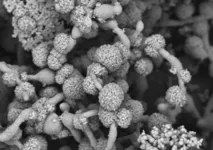(Press-News.org) Long Beach, Calif. – May 3, 2024 – Additional analysis from the SMall Annuli Randomized To Evolut or SAPIEN (SMART) study demonstrated clinical non-inferiority of self-expanding valves (SEV) versus balloon-expandable valves (BEV) in aortic stenosis patients undergoing transcatheter aortic valve replacement (TAVR) and confirmed valve performance superiority over time based on hemodynamics. Data also showed similar positive results in two age groups (< or ≥ 80 years old). The late-breaking results were presented today at the Society for Cardiovascular Angiography & Interventions (SCAI) 2024 Scientific Sessions.
Patients with aortic stenosis (AS) and small aortic annuli (SAA), typically female and underrepresented in clinical trials, are at risk for impaired valvular hemodynamics, or blood flow, and associated adverse cardiovascular outcomes following TAVR. The underrepresentation of women in research and the severity of the condition creates a call for more clinical data.
The SMART trial is an international, prospective, multi-center, randomized (1:1) post-market trial comparing the safety and performance of SEV versus BEV in TAVR patients with symptomatic severe AS and SAA. Eligible patients had an aortic valve annulus area of less than or equal to 430 mm2 by CT and suitable anatomy for transfemoral TAVR with an Evolut PRO/PRO+/FX or a SAPIEN 3/3 Ultra valve. The co-primary endpoints were: a clinical outcome composite of mortality, disabling stroke, or heart failure rehospitalization; and a valve function composite of bioprosthetic valve dysfunction (BVD) through 12 months.
A total of 716 patients (87% women, mean age 80 years) were treated at 83 sites. The SMART trial met both primary endpoints. Compared with BEV, the supra-annular SEV demonstrated non-inferior clinical outcomes and superior valve performance as measured by multiple definitions of bioprosthetic valve dysfunction (BVD) as well as by standard hemodynamics (doppler velocity index [DVI], effective orifice area [EOA], severe prosthesis‐patient mismatch [PPM], mean gradient >20 mmHg) at one year. As an additional analysis, the hemodynamics over time were evaluated and found to be similar between cohorts at baseline and favored SEV compared to BEV at all follow-up time points through 12 months (p<0.001). The results were also consistent in patients with age < or ≥ 80 years. BEV had a BVD difference of 39.8% for patients < 80 years old, and a BVD difference of 27.1% for patients ≥ 80 years old (both p<0.001).
“The SMART trial is the largest, most rigorous trial to date to randomize patients using the two most widely used TAVR devices, and the largest TAVR trial to enroll mostly women. We are excited to reiterate our previously presented findings in front of the interventional cardiologist community with our additional analysis,’’ said Howard C. Herrmann, MD, FACC, MSCAI, John W. Bryfogle Professor of Cardiovascular Medicine and Surgery, Health System Director and Section Chief of Interventional Cardiology, Perelman School of Medicine at the University of Pennsylvania, and lead author of the study. “This confirms the hemodynamic superiority of self-expanding supra-annular valves, which allow for greater options and improved decision-making for clinicians. It was also beneficial to see that this treatment option produced similar positive results for the more active younger patient population.”
Longer-term follow-up of the SMART trial is ongoing.
Session Details:
“Self-Expanding Versus Balloon-Expandable Transcatheter Aortic Valve Replacement in Patients with Small Aortic Annuli: Additional Outcomes from the SMART Trial”
Friday, May 3, 2024; 2:38-2:45 PM PT
Long Beach Convention Center, 104A, First Level
###
About Society for Cardiovascular Angiography & Interventions (SCAI)
The Society for Cardiovascular Angiography & Interventions, established in 1978, stands as the primary nonprofit medical society dedicated to representing invasive and interventional cardiology. SCAI's mission is to guide the global interventional cardiovascular community by fostering education, advocacy, research, and upholding standards for quality patient care. For more than 40 years, SCAI has exemplified professional excellence and innovation worldwide, cultivating a reputable community of over 4,500 members committed to advancing medical science and providing life-saving care for individuals, both adults and children, affected by cardiovascular disease. For more information, visit https://scai.org/.
For more information about the SCAI 2024 Scientific Sessions, visit https://scai.org/scai-2024-scientific-sessions. Follow @SCAI on X (formerly Twitter) and on LinkedIn for the latest heart health news and use #SCAI2024 to follow the latest discussions.
END
Study Title: Efficacy of [177Lu]Lu-PSMA-617 versus ARPI change in taxane-naive patients with metastatic castration-resistant prostate cancer by pre-randomization ARPI (PSMAfore)
Publication: American Urological Association Annual Meeting Plenary, May 3, 2024
Dana-Farber Cancer Institute author: Xiao X. Wei, MD
Summary: In a follow-on analysis of results from the phase 3 PSMAfore study, clinical investigators from Dana-Farber and elsewhere found that clinical outcomes consistently favored 177Lu-PSMA-617 over a change from one androgen receptor pathway inhibitor (ARPI) to another, regardless of which ARPI patients received first. ...
Late-Breaking Data Shows Endovascular Therapy Results in One-Third Reduction in Post-Procedural Complications for Women with PAD
Women and Asian Americans Less Likely to Undergo Endovascular Revascularization for PAD Compared to Men and Other Races
Long Beach, Calif. – May 3, 2024 – New clinical results highlight the need for inclusive approaches and comprehensive examinations of treatment options for peripheral artery disease (PAD), including endovascular therapy and revascularization. The data ...
Long Beach, Calif. – May 3, 2024 – New data from the REAL-PE analysis investigated catheter-based pulmonary embolism (PE) treatment, showing women and Black people were less frequently treated with minimally invasive therapy compared to men or non-Black patients. The late-breaking results were presented today at the Society for Cardiovascular Angiography & Interventions (SCAI) 2024 Scientific Sessions.
...
WASHINGTON (May 3, 2024) – Children with life-limiting rare diseases and their caregivers face tremendous stress and anxiety about the heart-breaking decisions before them. A new intervention – designed at Children’s National Hospital to support the palliative needs of these families – improved their spiritual and emotional well-being, according to new research published in the journal, Pediatrics.
Called FACE Rare (FAmily CEntered Pediatric Advance Care Planning Intervention for Rare Diseases), the counseling tools were found to be safe, effective and increased feelings of peace among families in this underserved ...
A research group at the Department of Biochemistry and Molecular Biology of the University of Seville has made a significant advance by discovering the crucial role of the protein Galectin-3 in the progression of various types of brain tumours. In these tumours, the most abundant immune system cells, microglia and macrophages, overexpress Galectin-3, which creates an immunosuppressed environment which inhibits the action of other immune cells against cancer cells.
In vitro findings have shown that specific inhibition of Galectin-3 in microglial cells promotes expression of proinflammatory markers and reverses the presence of key immunosuppressive ...
The University of Copenhagen is excited to announce Junevity as a Tier 3 Sponsor of the 11th Aging Research & Drug Discovery Meeting, the world's largest conference on aging research in the biopharmaceutical industry that will transpire on August 26 - August 30, 2024 on-site at the Ceremonial Hall, University of Copenhagen, and online.
Junevity is rewinding diseases of aging with novel transcription factor medicines. Based on 6 years of breakthrough research at UCSF, Junevity's REWINDTM platform identifies new targets based on large-scale genomics, machine learning, and cell aging experiments. Junevity is advancing multiple therapeutic programs towards ...
Climate change will cause an increase in extreme winter storms combining strong winds and heavy rainfall over the UK and Ireland, new research has shown.
The new study was led by experts at Newcastle University and the Met Office and investigated how future climate change may influence compound wind-rain extremes, which are events where extreme wind and rainfall occur simultaneously.
The researchers analysed data from climate simulations covering control (1981-2000) and future (2060-2081) periods, ...
Researchers working on solutions for antifungal resistance are being encouraged to apply to a new £3.4 million fund led by the University of Exeter with UK government funding.
The new fund, called FAILSAFE (Fungal AMR Innovations for LMICS: Solutions and Access For Everyone), is being launched by the University of Exeter’s MRC Centre for Medical Mycology, in partnership with the UK Department of Health and Social Care’s Global AMR Innovation Fund (GAMRIF).
Life-threatening fungal diseases take as many lives annually as TB or malaria, but the organisms ...
Evidence from archaeological sites in the medieval English city of Winchester shows that English red squirrels once served as an important host for Mycobacterium leprae strains that caused leprosy in people, researchers report May 3 in the journal Current Biology.
“With our genetic analysis we were able to identify red squirrels as the first ancient animal host of leprosy,” says senior author Verena Schuenemann of the University of Basel in Switzerland. “The medieval red squirrel strain we recovered is more closely related to medieval human strains from the same city than to strains isolated from infected ...
The first panoramic view of infection pathways in the human placenta has been created, which could highlight potential drug targets to develop pregnancy-safe therapies for malaria, toxoplasmosis and listeria, all diseases that can cause severe pregnancy complications.
Researchers from the Wellcome Sanger Institute, the University of Cambridge, the University of Dundee, and collaborators, used novel ‘mini placenta’ models to map the placental response to infections in early development. This ...






